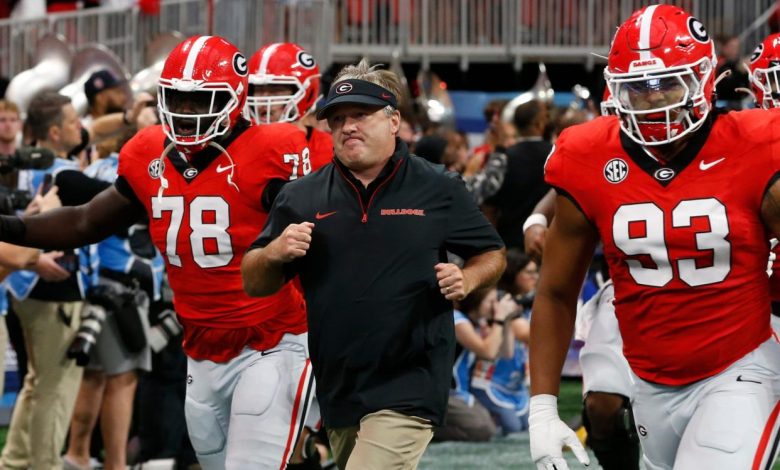The “Kirby Smart bill” seeks to provide tax exemptions for Georgia football and other state initiatives.

In recent years, the intersection of college football and state politics has become a focal point in many states across the country. As college football programs grow in stature, popularity, and financial power, they have become significant economic engines, not just for their respective universities but for the entire state. One of the most striking examples of this is the “Kirby Smart Bill,” a proposed piece of legislation in Georgia that aims to provide tax exemptions for the University of Georgia football program and other state initiatives related to athletics and higher education.
Named after Georgia’s successful head coach, Kirby Smart, the bill has sparked both praise and criticism, with proponents hailing it as a necessary step to bolster the state’s economy and the Georgia Bulldogs’ dominance in college football, while detractors argue that it could further blur the lines between public funds and college sports programs, raising ethical and financial concerns.
This article explores the key components of the “Kirby Smart Bill,” the motivations behind its introduction, the potential impacts on Georgia football, and the broader implications for college athletics in the state. Additionally, we will consider the potential challenges and criticisms the bill may face as it works its way through the legislative process.
The Economic Significance of Georgia Football
Georgia football has long been a cornerstone of the state’s identity and pride. As one of the premier programs in the Southeastern Conference (SEC), the Bulldogs’ success on the field has contributed significantly to the state’s economy. From ticket sales and merchandise revenue to the influx of fans and tourists during game days, Georgia football has an undeniable impact on the local economy.
According to recent studies, college football programs have become multi-billion-dollar industries, with the top programs like Georgia generating significant revenue. For example, the University of Georgia’s athletic department has reported annual revenues well over $100 million, driven in part by the football program’s success. These revenues not only fund other sports programs within the university but also contribute to the economic vitality of Athens and the broader state of Georgia, particularly on game days when thousands of fans converge for home games.
In this context, the “Kirby Smart Bill” seeks to provide additional tax relief to Georgia football, ensuring the program remains competitive and continues to generate revenue that benefits the entire state. But the bill is not limited to Georgia football—it also aims to support other state initiatives, including educational projects and community development programs. This broad approach to tax exemptions signals a new way of thinking about the relationship between state government and college athletics.
Key Components of the “Kirby Smart Bill”
The “Kirby Smart Bill” is primarily designed to provide tax exemptions to the University of Georgia football program, but it also extends to several other state initiatives that are tied to the development of athletic programs and educational funding. Below are the key components of the bill:
1. Tax Exemptions for Georgia Football
The central provision of the bill is the creation of tax exemptions for various aspects of the Georgia football program. These exemptions would apply to revenue generated by ticket sales, television deals, merchandise sales, and corporate sponsorships. In essence, the bill would provide Georgia football with a tax-free environment in which it could operate, similar to the exemptions already enjoyed by certain state-funded institutions and organizations.
The bill is seen by supporters as a way to further fuel the success of the program. With these exemptions in place, Georgia would have more financial flexibility to invest in recruiting, facilities, and coaching, which are all critical to maintaining their position as one of the top programs in college football. Given Kirby Smart’s success as head coach and the Bulldogs’ consistent presence in the College Football Playoff picture, proponents of the bill argue that this additional financial boost could allow Georgia to continue its dominance.
2. Support for Other State Athletic Programs
While the “Kirby Smart Bill” is most closely associated with the University of Georgia football program, it is not limited to just one sport. The bill includes provisions for other state athletic programs, including those in schools across the University System of Georgia. By broadening the scope to other sports, the bill aims to foster overall athletic development within the state and provide a more comprehensive support system for Georgia’s student-athletes.
Through tax exemptions, schools across the state would have more resources to enhance their facilities, attract top talent, and increase the visibility of their programs. By making it easier for schools to reinvest their revenue back into their athletic departments, the bill aims to elevate the overall level of competition within Georgia, providing a more balanced approach to state-supported sports.
3. Investment in Education and Community Development
In addition to its focus on athletics, the “Kirby Smart Bill” includes provisions for supporting educational initiatives and community development projects throughout Georgia. By granting tax exemptions to certain educational programs, including those focused on athletic scholarships and student-athlete development, the bill ensures that the benefits of college sports extend beyond the field and into the classroom and surrounding communities.
For example, the bill may provide tax breaks for schools offering specialized programs for student-athletes, such as academic tutoring, career counseling, and life skills training. These initiatives would help ensure that student-athletes have the necessary support to succeed academically and transition successfully into professional careers after graduation, whether in sports or other industries.
Additionally, the bill may provide funding for community development projects that capitalize on the economic benefits generated by college athletics. This could include investments in local infrastructure, such as transportation, housing, and entertainment venues, that cater to the influx of visitors during game days and other sporting events.
4. Economic Incentives for Local Businesses
Recognizing the role local businesses play in supporting college sports, the bill includes incentives for small businesses in Athens and surrounding areas that benefit from the presence of Georgia football. Restaurants, hotels, and retail stores that see increased business on game days and during the football season could be eligible for tax incentives under the bill, further stimulating the local economy.
This aspect of the bill underscores the broader economic impact that college athletics, particularly Georgia football, have on the state of Georgia. By ensuring that businesses in local communities are thriving, the bill aims to create a more inclusive and sustainable economic environment for the entire state.
Motivations Behind the “Kirby Smart Bill”
The motivations behind the “Kirby Smart Bill” are multifaceted. First and foremost, it is about maintaining Georgia football’s competitive edge. As the sport of college football becomes more financially driven, the need for programs to secure additional funding and resources has become paramount. With rivals like Alabama, Ohio State, and Clemson constantly investing in their football programs, the bill seeks to ensure that Georgia can compete at the highest level without being hindered by financial limitations.
Additionally, the bill is a reflection of Kirby Smart’s leadership and his desire to keep Georgia football on top. Since taking over as head coach in 2016, Smart has transformed Georgia into a perennial national championship contender. His success on the field has made him a powerful figure not only in college football but also in the state’s political landscape. By associating the bill with Smart, lawmakers hope to rally support from Georgia football fans, who are some of the most passionate and dedicated in the country.
Finally, the bill seeks to provide broader benefits to the state of Georgia, particularly through investments in education, community development, and local businesses. By using Georgia football as a vehicle for state-wide economic growth, the bill represents a new approach to how sports and state government can collaborate to achieve mutual benefits.
Criticisms and Challenges
While the “Kirby Smart Bill” has garnered significant support, it has also faced criticism. Opponents argue that the bill could further blur the lines between public funds and private college sports programs. Critics contend that providing tax exemptions to Georgia football could divert valuable resources away from other critical state initiatives, such as public education, healthcare, and infrastructure.
Some also argue that the bill could exacerbate the growing commercialization of college sports, making it harder for smaller programs to compete. By providing additional financial resources to an already elite program like Georgia, the bill could widen the gap between the top-tier programs and those with fewer resources.
Another concern is the ethical implications of using state funds to support a revenue-generating program like football, especially in light of the NCAA’s ongoing debate over the role of money in college athletics. Some believe that public funds should be used for the benefit of the community at large, rather than disproportionately supporting college sports programs that already generate millions of dollars in revenue.









